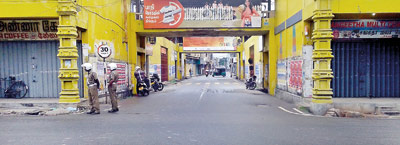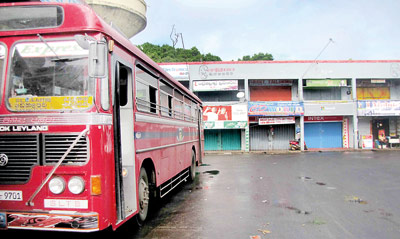News
Hartal in N&E disrupts daily life
Normal activities in the Northern and Eastern Provinces were disrupted as a hartal launched on Friday demanded the release of detainees held under charges for a long time without prosecution.

Deserted towns: Jaffna (above) and below (Vavuniya). Pix by N. Lohathayalan and Priyantha Hewage
Several towns across the two Provinces shut down completely in support of the hartal which disrupted the daily life of the public. Schools, shops, markets, banks and restaurants in Mannar, Jaffna, Kilinochchi, Mullaitivu, Batticaloa, Trincomalee and Vavuniya were closed bringing activity to a standstill.
The public strike was called by the Tamil National Alliance (TNA) and the Tamil National People’s Front (TNPF) demanding the immediate release of detainees held under the Prevention of Terrorism Act (PTA) followed by a general amnesty given by President Maithripala Sirisena.
Trade unions and teachers’ unions extended their full support for the hartal. Day to day life of the public was totally disrupted with limited public transport being available.
217 prisoners are detained under the PTA, which allows for indefinite detention without prosecution resulted in them languishing in jails for years.
TNA Parliamentarian Mavai Senathirajah told the Sunday Times that the Government should release the prisoners held on terrorism charges following a general amnesty given by the President.
“As the Government promised to the United Nations (UN) recently it should repeal the notorious PTA law immediately and replace it with an Act which is acceptable to the international community,” he said.

The Chamber of Commerce Jaffna (CCJ) which supported the hartal said that Friday’s hartal was very effective compared to any public strike in the recent past.
“The issue of prisoners detained for years is a political issue of the Tamil community and this could be the collective reflection of it demanding their immediate release,” CCJ Chairman Ratnalingam Jeyasekaram told the Sunday Times.
Mr. Jeyasekaram said the Tamil people voted for a change in January with many expectations including the release of their loved ones. Therefore, to retain their trust the new Government has to take some suitable action, otherwise those expectations would be broken.
“We have decided to support the hartal following a request by Tamil political parties and other civil organisations. President Maithripala Sirisena should take some courageous decisions when he is leading the country towards the path of reconciliation,” he said.
Sinnakili Piratheepan, a teacher from Thondaimanaru said if the Government failed to respond to the immediate needs of the Tamil community, such as the prisoners’ issue, it would be no different to the previous governments.
“While the Tamil politicians are engaged in manipulating facts telling different stories to the masses in the North and South, Tamil people think, whoever takes office. the Sri Lankan State machinery is discriminative towards the minority communities.
This could be a good opportunity to create a space for dialogue that might lead to reconciliation,” he said.
Meanwhile the Ceylon Teachers’ Union (CTU) also supported the hartal in the Provinces, with the minimum turnout of teachers and students in schools. Many teachers did not report to work on Friday.
CTU Secretary Joseph Stalin said the Government should have the political will to consider this issue as a political conflict with the minority communities and should start to implement the promises given to the people in the past without any delay.
“These persons are detained for years. They started to fight against the Government demanding the rights of the Tamil people. Then how can we consider them as political prisoners,” he asked.
TNPF General Secretary Selvarajah Gajendran said two of his party supporters were taken into custody on Thursday in Chavakachcheri town when they were distributing leaflefts calling for a hartal.
According to the police they were taken to the police station for a brief questioning and released. As a result of the hartal, President Maithripala Sirisena was forced to cancel his visit to Batticaloa, where he was due to take part in the opening of a newly constructed court complex.

